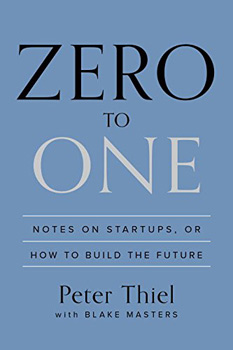Peter Thiel, and the not-so-secret secret of innovative success
It's also the not-so-secret secret to living a happy life


A free daily email with the biggest news stories of the day – and the best features from TheWeek.com
You are now subscribed
Your newsletter sign-up was successful
When you make a purchase through links on our site, we may earn a commission
You should read Peter Thiel's new book, Zero to One. Even if you don't have the slightest interest in business. Even (especially!) if you don't already avidly follow everything the PayPal founder and innovative entrepreneur says.
Zero to One is ostensibly about the startup business. Indeed, the subtitle is "Notes on Startups, or How to Build the Future." But the book is really about how you should live your life, whether or not you're an entrepreneur.
The Week
Escape your echo chamber. Get the facts behind the news, plus analysis from multiple perspectives.

Sign up for The Week's Free Newsletters
From our morning news briefing to a weekly Good News Newsletter, get the best of The Week delivered directly to your inbox.
From our morning news briefing to a weekly Good News Newsletter, get the best of The Week delivered directly to your inbox.

The book takes its title from Thiel's dictum that it's better to create something genuinely new (going from 0 to 1) than to copy what has already been done before (going from 1 to n). If you take a typewriter prototype and then mass-produce it, you have gone from 1 to n; if you look at a typewriter and invent a word processor, you have gone from 0 to 1.
Most of the early public debate about the book revolves around its thesis that "capitalism and competition are opposites." The goal of a capitalist is to accumulate capital, i.e. profits. Whereas, as the economics textbooks tell us, in a world of perfect competition, all profits are competed away. Airlines are ruthlessly competitive, and over their lifespan, all of America's airlines have produced a negative profit margin, and have lost shareholders money. Meanwhile, Google, which has a monopoly in search, is coining money, and has certainly made its shareholders very rich.
This is all very interesting for the business-minded among us, but what's easy to miss is that what's going on here isn't really economics; it's philosophy. Thiel's point is that you should do something unique; if you are doing something unique, by definition, you will be the only one doing it, and you will have a monopoly. (And if the unique thing you make is a thing lots of people want, you will make lots of money making it.)
Even though Thiel doesn't draw it out in the book, much of his thinking is derived from the work of the French philosopher René Girard, whose "mimetic theory" is a very compelling theory of religion, civilization, and human nature. Girard says our desire is "mimetic": we want things not because we actually want them, but because others want them and we imitate them. Mimetic desire causes strife, as we all fight and compete over the same things, for no good reason. The way the cycle is broken (if it is) is through the phenomenon of scapegoating. Society accuses some scapegoat of being the cause of the violence caused by everyone's mimetic desire, and takes out its violence on the scapegoat, thereby restoring social peace — until the cycle starts all over again. Girard analyzed how almost all religious myths, and most of the world's literature, are implicitly based on scapegoating and mimetic desire. Rome's founding charter was written in blood when Romulus killed his brother Remus for entering the city with weapons. In Greek tragedy, the protagonist who disturbs the social peace through his hubris must die so that order is restored. And today, anyone who has spent any time on social networks or watching TV or following politics will see the twin forces of mimetic desire and scapegoating at work.
A free daily email with the biggest news stories of the day – and the best features from TheWeek.com
In the business world, companies, blinded by mimetic desire, spend their time fighting their competitors for scraps instead of trying to do something genuinely new. When Google became ascendant, Microsoft, which is a desktop software company, invented a search engine. And Google came out with an online word processing suite to imitate Office. While those two were duking it out, Apple came out with the genuinely new iPhone and became the most valuable company in the world.
The way to value creation — and happiness! — is to escape the death cycle of mimetic desire and fruitless competition. Without even realizing it, all of us (yes, you too — be honest) spend our lives chasing things only because other people view them as valuable. That's how we choose our careers, build our social identities, and even choose our mates.
In the end, Thiel's book boils down to a truth that is deceptively simple and borderline corny: think for yourself. But as anyone who has truly attempted to do that knows, doing so is an enormously difficult endeavor, and we must work at it every day.
Pascal-Emmanuel Gobry is a writer and fellow at the Ethics and Public Policy Center. His writing has appeared at Forbes, The Atlantic, First Things, Commentary Magazine, The Daily Beast, The Federalist, Quartz, and other places. He lives in Paris with his beloved wife and daughter.
-
 6 of the world’s most accessible destinations
6 of the world’s most accessible destinationsThe Week Recommends Experience all of Berlin, Singapore and Sydney
-
 How the FCC’s ‘equal time’ rule works
How the FCC’s ‘equal time’ rule worksIn the Spotlight The law is at the heart of the Colbert-CBS conflict
-
 What is the endgame in the DHS shutdown?
What is the endgame in the DHS shutdown?Today’s Big Question Democrats want to rein in ICE’s immigration crackdown
